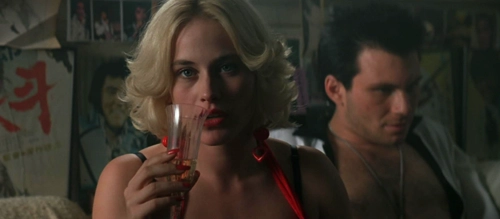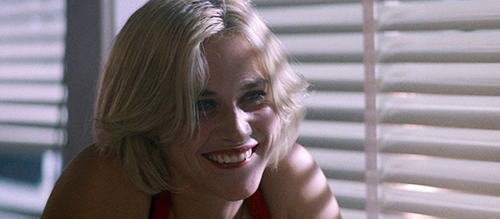
True Romance (1993)
Director: Tony Scott
Screenwriter: Quentin Tarantino
Starring: Christian Slater, Patricia Arquette, Dennis Hopper, Val Kilmer, Gary Oldman, Brad Pitt, Christopher Walken
Directed by Top Gun‘s Tony Scott and written by Pulp Fiction’s Quentin Tarantino, True Romance is a fantastical rollercoaster ride of a film. Its tale of two lovers on the run recalls films like Bonnie and Clyde and Badlands, and similarly features an unforgettable cast and memorable soundtrack. But amidst the impressive male star power, the film’s iconic female protagonist steals the show.
The opening half an hour of True Romance is like a short movie in itself. Christian Slater co-stars as Clarence, a movie nerd, who meets call girl Alabama, played by Patricia Arquette. The pair instantly fall in love, and after killing Alabama’s pimp and accidentally stealing a suitcase full of cocaine, the couple go on the run from the mafia in a purple Cadillac.
Perhaps the most noteworthy thing about the film is its incredible ensemble cast. Gary Oldman plays Drexl Spivey, an unforgettable drug-dealing pimp, with gold teeth and dreadlocks. “It must be white boy day,” he announces at the appearance of Clarence in his brothel. Brad Pitt is hilarious as Clarence’s stoner friend, who provides comic relief by casually offering the armed mafia a smoke of his bong. In one of the film’s most tense scenes, Christopher Walken plays a slick Sicilian mobster scarily well, interrogating Clarence’s dad (played by Dennis Hopper) in a masterfully suspenseful exchange. We also see the ghost of Elvis Presley (played by Val Kilmer), who appears a couple of times to offer advice to Clarence on his predicament.

The film has been described as “a male movie fantasy”, which to an extent is hard to argue with – a cocky young man is loyally adored by a beautiful woman who tells him how cool he is, and interprets his murder of her pimp as the ultimate romantic gesture. In a Little White Lies article, Alabama is described as being “reduced to the role of whore with a heart of gold”. However, beneath her sexualised appearance, and deceptively ditsy demeanour, Alabama is a strong female character in a typically male genre. She is no damsel in distress, but actually ends up being the hero, ultimately rescuing Clarence in an unconventional role reversal. Towards the end of the film, there is an empowering shot of her driving the open-top Cadillac with an injured Clarence leaning helplessly on her shoulder. She also literally drives the narrative, with a voice-over that opens and closes the film; one that is accompanied by Hans Zimmer’s iconic “You’re so cool” theme, a part of the great composer’s dreamy xylophonic score inspired by the music of Terrence Malick’s 1973 couple-on-the-run film Badlands.
In the film’s most harrowingly violent scene, Alabama is brutally beaten by a mafia member (a chillingly sinister James Gandolfini). Extreme violence is synonymous with the work of Quentin Tarantino, but unlike the film’s later comedically excessive shootout, this scene is hard to watch. Vitally, the catharsis with which the violence ends is a punch-the-air moment, which switches her position of victim to badass avenging hero. Underestimated by those around her, Alabama reclaims her agency and power, transitioning from a seemingly naïve giggle to the guttural scream of a woman who will no longer be subjected to abuse.
True Romance succeeds in captivating us even thirty-plus years later because of its thrilling narrative and impeccable ensemble cast, but we are left in no doubt that the star of the show is Patricia Arquette. In this respect, Tony Scott follows his brother Ridley Scott’s use of strong female characters in a typically male genre, True Romance becoming reminiscent of the elder brother’s Alien (1979) and Thelma & Louise (1991). It’s easy to forgive a film for its overall lack of female characters when it centres around one as iconic as Alabama Worley.
Score: 19/24
Written by Gala Woolley
You can support Gala Woolley in the following places:
Twitter – @GalaWoolley
Blog – screenqueens.co.uk

